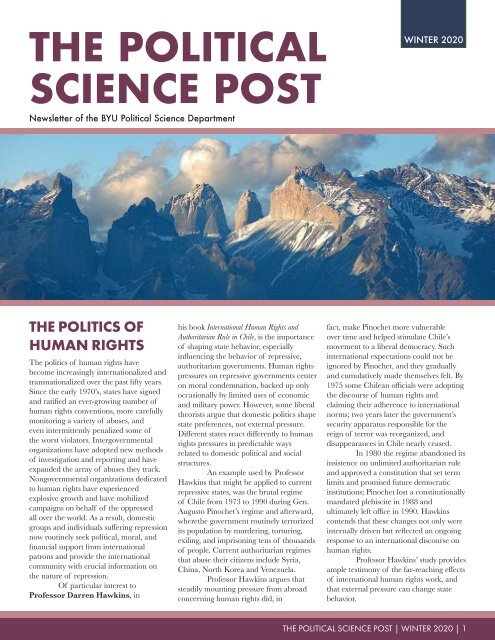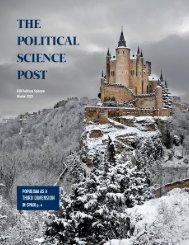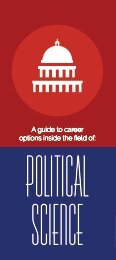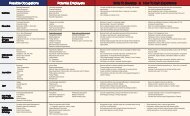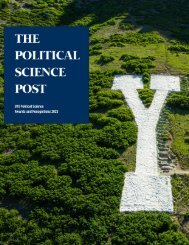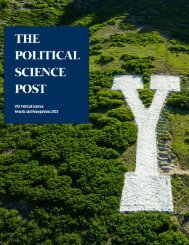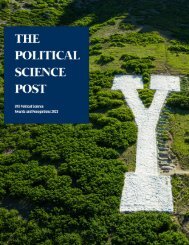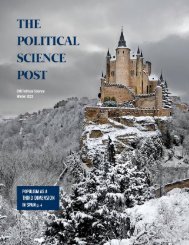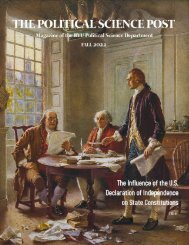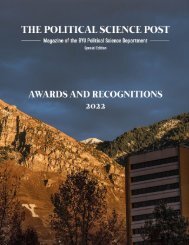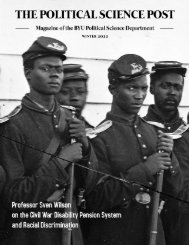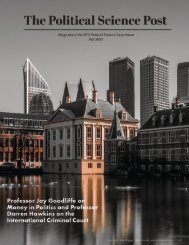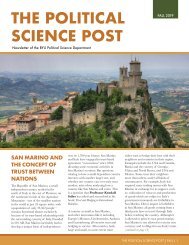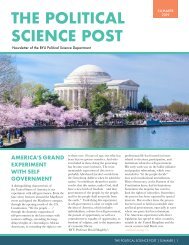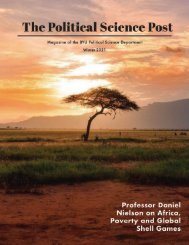winter-2020
Create successful ePaper yourself
Turn your PDF publications into a flip-book with our unique Google optimized e-Paper software.
THE POLITICAL<br />
SCIENCE POST<br />
WINTER <strong>2020</strong><br />
Newsletter of the BYU Political Science Department<br />
THE POLITICS OF<br />
HUMAN RIGHTS<br />
The politics of human rights have<br />
become increasingly internationalized and<br />
transnationalized over the past fifty years.<br />
Since the early 1970’s, states have signed<br />
and ratified an ever-growing number of<br />
human rights conventions, more carefully<br />
monitoring a variety of abuses, and<br />
even intermittently penalized some of<br />
the worst violators. Intergovernmental<br />
organizations have adopted new methods<br />
of investigation and reporting and have<br />
expanded the array of abuses they track.<br />
Nongovernmental organizations dedicated<br />
to human rights have experienced<br />
explosive growth and have mobilized<br />
campaigns on behalf of the oppressed<br />
all over the world. As a result, domestic<br />
groups and individuals suffering repression<br />
now routinely seek political, moral, and<br />
financial support from international<br />
patrons and provide the international<br />
community with crucial information on<br />
the nature of repression.<br />
Of particular interest to<br />
Professor Darren Hawkins, in<br />
his book International Human Rights and<br />
Authoritarian Rule in Chile, is the importance<br />
of shaping state behavior, especially<br />
influencing the behavior of repressive,<br />
authoritarian governments. Human rights<br />
pressures on repressive governments center<br />
on moral condemnation, backed up only<br />
occasionally by limited uses of economic<br />
and military power. However, some liberal<br />
theorists argue that domestic politics shape<br />
state preferences, not external pressure.<br />
Different states react differently to human<br />
rights pressures in predictable ways<br />
related to domestic political and social<br />
structures.<br />
An example used by Professor<br />
Hawkins that might be applied to current<br />
repressive states, was the brutal regime<br />
of Chile from 1973 to 1990 during Gen.<br />
Augusto Pinochet’s regime and afterward,<br />
wherethe government routinely terrorized<br />
its population by murdering, torturing,<br />
exiling, and imprisoning tens of thousands<br />
of people. Current authoritarian regimes<br />
that abuse their citizens include Syria,<br />
China, North Korea and Venezuela.<br />
Professor Hawkins argues that<br />
steadily mounting pressure from abroad<br />
concerning human rights did, in<br />
fact, make Pinochet more vulnerable<br />
over time and helped stimulate Chile’s<br />
movement to a liberal democracy. Such<br />
international expectations could not be<br />
ignored by Pinochet, and they gradually<br />
and cumulatively made themselves felt. By<br />
1975 some Chilean officials were adopting<br />
the discourse of human rights and<br />
claiming their adherence to international<br />
norms; two years later the government’s<br />
security apparatus responsible for the<br />
reign of terror was reorganized, and<br />
disappearances in Chile nearly ceased.<br />
In 1980 the regime abandoned its<br />
insistence on unlimited authoritarian rule<br />
and approved a constitution that set term<br />
limits and promised future democratic<br />
institutions; Pinochet lost a constitutionally<br />
mandated plebiscite in 1988 and<br />
ultimately left office in 1990. Hawkins<br />
contends that these changes not only were<br />
internally driven but reflected an ongoing<br />
response to an international discourse on<br />
human rights.<br />
Professor Hawkins’ study provides<br />
ample testimony of the far-reaching effects<br />
of international human rights work, and<br />
that external pressure can change state<br />
behavior.<br />
THE POLITICAL SCIENCE POST | WINTER <strong>2020</strong> | 1
TABLE OF CONTENTS<br />
3<br />
5<br />
11<br />
12<br />
EVENTS &<br />
PROGRAMS<br />
Read about the recent events on and<br />
off BYU campus.<br />
PEOPLE<br />
Spotlights on students, professors,<br />
and alumni alike. Hear more about<br />
professor publications.<br />
POLITICS<br />
Read more on faculty’s discussion of<br />
politics through Julie Rose’s Top of Mind<br />
ENGAGED<br />
LIVING<br />
Learn how to become more involved<br />
with the aims and mission behind<br />
BYU Political Science.<br />
The BYU Department of Political<br />
Science, consistent with the aims of<br />
a BYU education, intends to foster<br />
“Lifelong Learning and Service.”<br />
We hope to provide our alumni<br />
with intelligent, thoughtful and<br />
sophisticated analysis of important<br />
issues, and to act as a catalyst<br />
for service in our communities,<br />
neighborhoods, nations and the world.<br />
Connect with us on social media<br />
@BYUPAS<br />
BYU POLITICAL AFFAIRS SOCIETY<br />
@BYUPAS<br />
@BYUPOLITICALSCI<br />
BYUPOLITICALSCIENCEBLOG.COM<br />
BYU POLI SCI STORIES @YOUTUBE<br />
THE POLITICAL SCIENCE POST | WINTER <strong>2020</strong> | 2
EVENTS &<br />
PROGRAMS<br />
GLOBAL GOVERNANCE JOURNAL IN NEW<br />
YORK CITY ON OCTOBER 15, 2019<br />
The Global Governance Journal, which is hosted by BYU Political Science until<br />
2023, under the direction of Professor Kendal Stiles, who is co-editor in chief,<br />
hosted an author discussion series on October 15, 2019, at the Australian Mission<br />
to the UN in New York City. Author Courtney Fung from the University of Hong<br />
Kong, and an Australian citizen, spoke about Chinese participation in Peacekeeping<br />
Missions by the UN. The event was conducted and presented by BYU Kennedy<br />
Center and BYU Political Science.<br />
PAS ANNUAL SYMPOSIUM WITH DR.<br />
BRENDAN NYHAN ON NOVEMBER 7TH, 2019<br />
PAS Annual Symposium, Dr. Brendan Nyhan of Dartmouth College spoke on the<br />
Causes and Effects of Fake News, on Thursday, November 7th at 11 AM in B192<br />
JFSB. Professor Brendan Nyham spoke about the idea of “fake news.” Nyham<br />
suggests that our democracy is vulnerable, and that Facebook is porous, and so we<br />
need to keep a watchful eye on what influences us both internally and externally.<br />
Thank you, Brendan Nyham, for a fascinating discussion.<br />
DEBATE NIGHT ON NOVEMBER 7TH, 2019<br />
The College Democrats versus the College Republicans, Thursday, November 7,<br />
2019, at 7 PM in W112 Benson Building, wherein they debated current topics of the<br />
Iranian nuclear deal, carbon emissions, gun control, and democratic socialism.<br />
U.S. NATIONAL SECURITY FORUM BY ROBERT<br />
C. O’BRIAN ON DECEMBER 9TH, 2019<br />
Current Trump Administration U.S. National Security Advisor Robert O’Brien<br />
was on campus answering questions about national security on Monday, December<br />
9, 2019, at 10:30 AM at the Varsity Theater. The event was sponsored by the BYU<br />
Political Science Department and BYU President Worthen was in attendance. Mr.<br />
O’Brien reiterated that the U.S. wants to have great relations with China that are<br />
fair. He said that we need to be so strong that any country opposing us, including<br />
China, understands that consequences will be devastating.<br />
THE POLITICAL SCIENCE POST |SUMMER 2019 | 3<br />
THE POLITICAL SCIENCE POST | WINTER <strong>2020</strong> | 3
POLITICAL SCIENCE STUDENT POSTER<br />
CONFERENCE 2019<br />
Tuesday, December 10th, 2019<br />
The 2019 PSSPC was held on Tuesday, December<br />
10, 2019, from noon to 3 PM in the Wilkinson<br />
Center Garden Court. The Poster Conference is an<br />
opportunity for students to engage in “experiential<br />
learning,” which helps them focus their ideas and<br />
present them in a public forum. Approximately 90<br />
students participated in this year’s event and 18<br />
students either received awards or were recognized<br />
for their honorable achievement.<br />
WINNERS LIST<br />
Professor Chad Nelson was the judge for the poster<br />
conference. He made the following awards:<br />
First Prize ($300):<br />
Katrina Cole, Margaret Jarvis, Pearce Solomon:<br />
“Deep State & Dark Money: Partisan<br />
Conspiratorial Thinking”<br />
Second Prize ($200):<br />
Camilla Alarcon, Annie Jarman, Taylor Petersen:<br />
“Electoral Fraud: Who Cares? How<br />
Partisanship Influences Perceptions of<br />
Electoral Fraud”<br />
Third Prize ($100):<br />
Madeline Beck, George Garcia, Jessica Powell:<br />
“What Influences Latin American Policy<br />
Makers?”<br />
Honorable Mentions (in<br />
alphabetical order by first<br />
author’s last name) :<br />
Jacob Harris: “Getting Tough: The<br />
Relationship Between Racial Resentment,<br />
Religion, and Positive Attitudes”<br />
Janessa James, Layla Shaaben: “Follow the<br />
Prophet: Political Signaling by Religious<br />
Leaders”<br />
Annie Jarman, Kunmi Ogunfeibo: “Do Americans<br />
Just Vote for the Hottest Candidate?”<br />
Natalie White: “Uncertainty and Populist<br />
Rhetoric: What are the core elements of<br />
populist rhetoric?”<br />
Abby Woodfield, Tayla Ingles, Audrey Stacey:<br />
“Nature: the Great Equalizer”<br />
THE POLITICAL SCIENCE POST | WINTER <strong>2020</strong> | 4
Political Philosopher<br />
ROBERTO UNGER<br />
Roberto Mangabeira Unger; (born 24 March 1947) is a Brazilian<br />
philosopher and politician who is Professor at Harvard Law School. He<br />
has developed his views and positions across many fields including legal<br />
theory, philosophy and religion, social and political theory, progressive<br />
alternatives, and economics. Dr. Unger gave a lecture on Brigham Young<br />
University campus on January 22nd, <strong>2020</strong>, at the J. Reuben Clark Law<br />
School at noon.<br />
In natural philosophy he is best known for his 2015 work The Singular<br />
Universe and the Reality of Time which “presents, in the context of<br />
an engagement with cosmology and physics, the vision of a universe<br />
in which everything, including the structure and the laws of nature,<br />
changes sooner or later”. In legal theory he is best known for his work in<br />
the 1970s–1990s as part of the Critical Legal Studies movement, which<br />
helped disrupt the methodological consensus in American law schools.<br />
His political activity helped the transition to democracy in Brazil in the<br />
aftermath of the military regime, and culminated with his appointment<br />
as Brazil’s Minister of Strategic Affairs in 2007 and again in 2015. His<br />
work is seen to offer a vision of humanity and a program to empower<br />
individuals and change institutions.<br />
At the core of his philosophy is a view of humanity as greater than the<br />
contexts in which it is placed. He sees each individual possessed with<br />
the capability to rise to a greater life. At the root of his social thought<br />
is the conviction that the social world is made and imagined. His work<br />
begins from the premise that no natural or necessary social, political, or<br />
economic arrangements underlie individual or social activity. Property<br />
rights, liberal democracy, wage labor—for Unger, these are all historical<br />
artifacts that have no necessary relation to the goals of free and<br />
prosperous human activity. For Unger, the market, the state, and human<br />
social organization should not be set in predetermined institutional<br />
arrangements, but need to be left open to experimentation and revision<br />
according to what works for the project of individual and collective<br />
empowerment. Doing so, he holds, will enable human liberation.<br />
Unger has long been active in Brazilian opposition politics. He was<br />
one of the founding members of the Brazilian Democratic Movement<br />
Party and drafted its manifesto. He directed the presidential campaigns<br />
of Leonel Brizola and Ciro Gomes, ran for the Chamber of Deputies,<br />
and twice launched exploratory bids for the Brazilian presidency. He<br />
served as the Minister of Strategic Affairs in the second Luiz Inácio<br />
Lula da Silva administration and the beginning of the second Dilma<br />
administration. Unger is also the subject of the feature documentary<br />
Visions for the Future directed by Robert Rippberger chronicling his<br />
work in Brazil in the Amazonian state of Rondônia putting theory into<br />
practice.<br />
[Source: https://en.wikipedia.org/wiki/Roberto_Mangabeira_Unger; See also “Politics: The Central Texts” by Roberto<br />
Unger.]<br />
THE POLITICAL SCIENCE POST | WINTER <strong>2020</strong> | 5
SPOTLIGHTS<br />
ALUMNI<br />
CHASE J. FOWERS<br />
Chase is a data analyst<br />
at WPA Intelligence in<br />
Washington, DC 214 Fourth<br />
Street, SE, and does sales<br />
and marketing at Aptive<br />
Environmental. He studied<br />
Political Science at BYU and<br />
is from Augusta, Georgia. He<br />
went to Lakeside High School<br />
in Evans, Georgia. In the Fall<br />
of 2019, Chase gave advice<br />
to BYU students for finding jobs in DC, including the<br />
following: First: Workshop your resume. Poli sci students<br />
might find it difficult to describe/quantify their work as<br />
undergrads, but it can be done. BYU’s Poli Sci department<br />
is first class and requires its students to become excellent<br />
writers, researchers, and analysts. Second: Work as a<br />
research assistant. Begin building a professional network<br />
and skill sets. Third: Talk to EVERYONE. LinkedIn is a<br />
good platform for that. If you can find BYU alumni or<br />
people with whom you have mutual friends, that is gold.<br />
Thank you, Chase, for your excellent advice.<br />
ALLYSE MEANEA<br />
Graduated in August 2019,<br />
Allyse is studying in Kings<br />
College in London, a Master<br />
in European Studies. She<br />
did an internship with State<br />
Department summer 2019,<br />
and was on Beyond BYU<br />
2019 in Washington, DC.<br />
CATE STOLWORTHY KLUNT<br />
Government Affairs Director at<br />
Utah Association of Realtors.<br />
Cate studied Political Science<br />
and Communications at BYU.<br />
While here, she started working<br />
in communications for the first<br />
female Speaker of the Utah<br />
House, Becky Lockhart, and has<br />
since had an almost unhealthy<br />
obsession with Utah politics. She<br />
went on to work as the lobbyist for<br />
the Utah Association of Public Charter Schools, and most<br />
recently she worked at World Trade Center Utah where she<br />
took a legislative diplomatic delegation to China and didn’t<br />
lose a single Senator. She also has a dog names Pancakes.<br />
YEAH SAMAK<br />
Yeah Samak is the Country<br />
Director at Empower<br />
Mali, and Mayor of<br />
Ouelessebougou. He was<br />
the former language and<br />
cultural facilitator at Peace<br />
Corps Mali. He studied Public<br />
Policy at BYU and lives in<br />
Ouelessebougou, Koulikoro,<br />
Mali and is married to<br />
Marissa Coutinho Samake.<br />
He was recently honored<br />
as a distinguished alumni at BYU, after which he said:<br />
“After the honors by BYU Alumni Association that I have<br />
accepted with humility, I find happiness under the mango<br />
at my home in Ouelessebougou. Big thank you to all for<br />
the family, material and moral support!” Congratulations<br />
to Yeah for all his good work.<br />
THE POLITICAL SCIENCE POST | WINTER <strong>2020</strong> | 6
SPOTLIGHTS<br />
STUDENT<br />
ELIZA BENNETT<br />
Eliza grew up in Sandy,<br />
Utah and wants to work<br />
for a development agency<br />
in Washington, DC such as<br />
the World Bank or CARE<br />
international working in<br />
international development<br />
policy with a focus on<br />
gender: women and men<br />
in the developing world. She recently traveled to Malawi<br />
and worked at the School of Agriculture for Family<br />
Independence (SAFI) and ran a research project to<br />
determine the effect that the gender of students was having<br />
on their educational experience. She found that 75% of<br />
men finished their coursework, while only 25% of women<br />
finished. She is working to find solutions to this problem.<br />
Her family history includes her grandfather, former Utah<br />
Senator Bob Bennett. At BYU she has worked at the<br />
Global Politics lab and is the advertising chair for BYU’s<br />
Political Affairs Society. She was student body president<br />
at Jordan High School and was a finalist in the Sterling<br />
Scholar Social Science sector in Utah. She would like to<br />
pursue a Master’s in Public Policy (MPP) at Georgetown<br />
University.<br />
IN MEMORIAM<br />
REBECCA RUSSAVAGE<br />
Rebecca Russavage is from<br />
China Hills, California and<br />
graduated in December 2019<br />
with honors in the double<br />
majors Political Science and<br />
Sociology, with a double minor<br />
in International Development<br />
and Women’s Studies. She<br />
has had a busy undergraduate<br />
career: living and working on five continents, co-founding<br />
an NGO called “Girls Lobby” that teaches high school<br />
girls about civic engagement, participating in four Model<br />
United Nations conferences, and presenting to the UN at<br />
the Civil Society Conference during the summer of 2019.<br />
She says that she can get excited about basically everything:<br />
international relations, books, ice cream, Star Wars, and<br />
especially food. However, she chose her academic paths<br />
because she loves people and politics. She thinks it is so<br />
fascinating to not only try to understand why people are,<br />
who they are, and do what they do (hence my Sociology<br />
major), but also what they do with that identity and how<br />
they choose to manage the world (Political Science). She is<br />
off to Washington, DC in January <strong>2020</strong>.<br />
WADE JACOBY<br />
1964-<strong>2020</strong><br />
Students, colleagues and friends around the globe are mourning the tragic loss of Professor<br />
Wade Jacoby, who passed away without warning on Saturday, February 29, <strong>2020</strong>. At the<br />
time of his death, Wade was mountain biking—one of his many, many passions—with close<br />
friends and colleagues at the university. Wade has an extensive network of relationships, and<br />
we know that hundreds, even thousands, are mourning this great loss. Tributes to Professor<br />
Jacoby will be included in the next issue of the Political Science Newsletter.<br />
THE POLITICAL SCIENCE POST | WINTER <strong>2020</strong> | 7
FACULTY SPOTLIGHT<br />
Darren Hawkins grew up in Salt Lake City and went to Olympus<br />
High School. When he was growing up he had a newspaper route, and he<br />
and his mother delivered newspapers from the back of her station wagon.<br />
They delivered 180 Deseret Newspapers, and while delivering, he says,<br />
he used to read the headlines. This began his interest in political science.<br />
He went to the University of Utah for undergraduate work, then served a<br />
mission to Uruguay. During his mission, Central America was in a time of<br />
civil war in Nicaragua and El Salvador, with the Sandinista’s and Contra’s.<br />
He began to love the culture of Central America through Uruguay,<br />
where there were no riots or strife, and no blood shed as in other central<br />
American states.<br />
Darren received his PhD at the University of Wisconsin at<br />
Madison, and specialized in Human Rights and Central and South<br />
America. After his PhD, he brought his wife and two year old to Santiago,<br />
Chile to do research. One of the key moments of his research was to be an<br />
interview of the Commander of the Chilean Air Force, Rodolfo Stange,<br />
who was a member of the Government Junta that ruled Chile during the<br />
dictatorship period from 1973 to 1990, representing the police force. On<br />
the day he arrived for the interview, he got out of the subway and found<br />
that the armed forces had surrounded the building where his interview was<br />
to be, with automatic weapons. It appeared to be a coup d’etat. Darren<br />
walked up to the military line and showed his credentials and said he was<br />
to interview Stange. They let him through, and he made it to the waiting<br />
room for the general, but he found out that Stange had been indicted by<br />
the courts for Human Rights abuses, and that the military and police force<br />
had stepped in to protect him, by surrounding the building, something<br />
that would never happen in the U.S.A. While he was waiting in the office,<br />
20-30 women supporting Stange showed up. Stange needed to meet<br />
with his supporters, so Darren never got the interview. It was a standoff<br />
between the courts and the military and police, and Stange never appeared<br />
in court. Darren learned the reality of power and how it works in the<br />
South American countries, in a way unfamiliar to people in the western<br />
democracies.<br />
Darren is the vice Chairman of the Board for LDS Earth<br />
Stewardship, a non-profit for members of the Church of Jesus Christ of<br />
LDS and other interested parties, promoting conservation and stewardship<br />
over the earth. Anyone who would like to be involved can find out more at<br />
ldsearthstewardship.org.<br />
One of Darren’s favorite quotes comes from Sharon Eubank, of<br />
the LDS Relief Society Presidency:<br />
“I thought I would share what I consider to be the intersection between<br />
humanitarian work—the subject I live and breathe every single day—and<br />
earth stewardship, which all of us here tonight care so much about. The<br />
conversations on this topic have become polarized, easily devolving into<br />
politics represented by two cable channels. That is a shame. What is useful<br />
to me would be to find new ways of discussing the subjects of how to<br />
protect and care for the planet where we live in ways many more people<br />
can engage with.”<br />
DARREN<br />
HAWKINS<br />
Ph.D in Human Rights at<br />
University of Wisconsin at<br />
Madison<br />
THE THE POLITICAL SCIENCE POST POST | SUMMER |WINTER 2019 <strong>2020</strong>| | 12 7<br />
8
FACULTY SPOTLIGHT<br />
Assistant Professor Chad Nelson grew up in the Bay<br />
Area and came to BYU as a Philosophy undergraduate. He was<br />
interested in big questions. During the summer of 2001, after his<br />
undergraduate work at BYU, Chad decided to take a world tour,<br />
starting in Jordan, and weaving through the Middle East and Asia.<br />
He left for Iran on a Cargo ship from the United Arab Emirates,<br />
and travelled to Afghanistan with a young man who turned out to<br />
be a member of Al Qaeda. The man spoke broken English, and<br />
Chad had a beard so he didn’t know that Chad was an American.<br />
After Afghanistan, Chad went through Oman, Iran, Uzbekistan,<br />
China, India, Thailand, and Nepal. Preceding the world tour, he<br />
worked on the Union Pacific rail road for nearly a year, in Idaho,<br />
as a laborer, 10 hours a day, pounding spikes into rails. He had to<br />
hit the head of the spike right in the center or the sledge hammer<br />
would miss and hit the metal rails or plates, causing injury to his<br />
hands and arms.<br />
After his world tour, Chad studied at Columbia University<br />
toward a Master’s degree and was in New York City on September<br />
11, 2001. He was on the subway at 168th Street going uptown,<br />
and noticed that they had closed all subways going downtown.<br />
He exited the subway and heard about the World Trade Center<br />
attack, and decided to walk down town from Columbia to see if he<br />
could help. When he arrived, Tower 6 was still on fire and had not<br />
collapsed yet. He left before it did, as there was little he could do<br />
and the fire and police departments had cordoned off that section<br />
of town. He received his PhD from the University of California Los<br />
Angeles, and his research now focusses on the international effects<br />
of revolutions, the interaction between domestic instability and<br />
international politics, and the rise of great powers. His current book<br />
project (hopefully published in 2021) investigates how revolutionary<br />
states can act as platforms and models in spreading a new regime<br />
type in the international system, and how other states respond to<br />
that possibility.<br />
Chad is an Assistant Professor in the Department of<br />
Political Science at Brigham Young University and has received<br />
continuing faculty status. Chad recieved his B.A in Philosophy at<br />
Brigham Young University. He went on to complete his doctrate in<br />
Political Science at the University of California in Los Angeles.<br />
CHAD E.<br />
NELSON<br />
B.A. in Philosophy at<br />
Brigham Young University<br />
Ph.D from University of<br />
California Los Angeles<br />
THE THE POLITICAL SCIENCE POST POST | SUMMER | WINTER 2019 <strong>2020</strong>| | 12 78<br />
9
FACULTY PUBLICATIONS<br />
International Human Rights and Authoritarian Rule in Chile<br />
DARREN HAWKINS<br />
What is the influence of international human rights activism on authoritarian governments in<br />
the modern era? How much can pressure from human rights organizations and nations affect<br />
political change within a county? This book addresses these key issues by examining the impact of<br />
transnational human rights organizations and international norms on Chile during Gen. Augusto<br />
Pinochet’s regime (1973–90) and afterward.<br />
Darren G. Hawkins argues that steadily mounting pressure from abroad concerning human rights<br />
did, in fact, make Pinochet more vulnerable over time and helped stimulate Chile’s movement<br />
to a liberal democracy. In 1980 the regime abandoned its insistence on unlimited authoritarian<br />
rule and approved a constitution that set term limits and promised future democratic institutions;<br />
Pinochet lost a constitutionally mandated plebiscite in 1988 and ultimately left office in 1990.<br />
Hawkins contends that these changes not only were internally driven but reflected an ongoing<br />
response to an international discourse on human rights.<br />
Europe and the Management of Globalization<br />
(Journal of European Public Policy Series) 1st Edition, Ed.<br />
WADE JACOBY<br />
European politicians often speak of their efforts to ‘manage globalization.’ At one level, this is<br />
merely a rhetorical device to make globalization more palatable to citizens and prove that policymakers<br />
are still firmly in control of their country’s fate. This volume argues that the advocacy<br />
of managed globalization goes beyond rhetoric and actually has been a primary driver of major<br />
European Union (EU) policies in the past twenty years. The EU has indeed tried to manage<br />
globalization through the use of five major mechanisms: 1) expanding policy scope 2) exercising<br />
regulatory influence 3) empowering international institutions 4) enlarging the territorial sphere<br />
of EU influence, and 5) redistributing the costs of globalization. These mechanisms are neither<br />
entirely novel, nor are they always effective but they provide the contours of an approach to<br />
globalization that is neither ad hoc deregulation, nor old-style economic protectionism.<br />
Delegation and Agency in International Organizations<br />
DAVID LAKE, DARREN G. HAWKINS, DANIEL NIELSON, AND MICHAEL TIERNEY<br />
Why do states delegate certain tasks and responsibilities to international organizations rather<br />
than acting unilaterally or cooperating directly? Furthermore, to what extent do states continue<br />
to control IOs once authority has been delegated? Examining a variety of different institutions<br />
including the World Trade Organization, the United Nations and the European Commission,<br />
this book explores the different methods that states employ to ensure their interests are<br />
being served, and identifies the problems involved with monitoring and managing IOs. The<br />
contributors suggest that it is not inherently more difficult to design effective delegation<br />
mechanisms at international level than at domestic level and, drawing on principal-agent<br />
theory, help explain the variations that exist in the extent to which states are willing to delegate<br />
to IOs. They argue that IOs are neither all evil nor all virtuous, but are better understood as<br />
bureaucracies that can be controlled to varying degrees by their political masters.<br />
THE POLITICAL SCIENCE POST | SUMMER 2019 | 13<br />
THE POLITICAL SCIENCE POST | WINTER <strong>2020</strong> | 10
FACULTY IN THE NEWS<br />
Julie Rose’s Top of Mind<br />
SEPTEMBER 17, 2019<br />
Chris Karpowitz had a great chat about the American Family Survey on “Top<br />
of Mind” on September 17, 2019! We’ve seen growing income inequality<br />
and national protests about racial inequality. In the midst of all of this, how are<br />
American families faring? Answering that question is the aim of the American<br />
Family Survey from BYU’s Center for the Study of Elections and Democracy.<br />
Here’s the link: https://bit.ly/32Ep587<br />
OCT 17, 2019<br />
Wendy Pearlman did come on – the same day Chris Karpowitz came on in<br />
October, actually. Political scientist Wendy Pearlman has spent the last 8 years<br />
speaking with Syrians at length about their motivation for protesting, their hopes<br />
and regrets and the war drags on. In 2017, she published excerpts of those<br />
interviews in a book called “We Crossed a Bridge and it Trembled.” Listen to it<br />
here: https://bit.ly/396lRNK<br />
NOV 21, 2019<br />
Which side is winning –if there is any winning when impeachment is on the line?<br />
Chris was on again in November re: impeachment.<br />
Listen to it here: https://bit.ly/2QuBhF6<br />
DEC 17, 2019<br />
Quinn Mecham has been on almost monthly in December. Here he talked<br />
about topics beyond US borders for a few minutes. Here’s a link to listen along<br />
to: https://bit.ly/3bgp0fg<br />
DEC 19, 2019<br />
President Donald Trump has been impeached by the US House of<br />
Representatives. Michael Barber came on to discuss the implications of the<br />
impeachment in December.<br />
Listen here: https://bit.ly/2QxUC8h<br />
JAN 7, <strong>2020</strong><br />
Regular Top of Mind contributor Quinn Mecham gives his predictions for what<br />
he thinks we might see in world political events in <strong>2020</strong><br />
Here’s the link: https://bit.ly/2whCWHo<br />
THE POLITICAL SCIENCE POST | WINTER <strong>2020</strong> | 11
ENGAGED<br />
LIVING<br />
Serving our communities<br />
and country can bring<br />
fulfillment and can easily be<br />
part of a well-rounded life.<br />
Take advantage of the local<br />
and national opportunities<br />
to serve. Local BYU Political<br />
Science Alumni Chapters,<br />
such as those in New York<br />
City, Washington, DC, and<br />
in the Bay Area can help<br />
assist in the desire<br />
to serve.<br />
FACULTY QUOTE<br />
“A church worldwide in spirit--whatever else it is--reflects the minds and<br />
hearts of its individual members. It requires members who are sensitive<br />
to other people’s sensitivities; members who share psychologically and<br />
materially with each other as well as in a common transcendent vision;<br />
members who are empathic and therefore capable of putting themselves<br />
in their brother’s [and sister’s] shoes; and above all members who do<br />
not confuse their personal preferences with the Gospel of Jesus Christ.<br />
Becoming a worldwide religion in spirit as well as in organization is<br />
much more than building organizations and translating documents and<br />
scriptures, and sharing them with other peoples in their own languages.<br />
Now we see that if we Mormons are to experience the universal<br />
brotherhood [and sisterhood] we seek, then all of us must make some<br />
alterations in our views of one another. This will mean an increased<br />
giving and taking--one that is as psychological and material as it is spiritual.<br />
We will need to increase our empathy and cross cultural sensitivity and<br />
progressively discard prejudices incompatible with brotherhood. Gospel<br />
ideas are revolutionary for this life as well as the next because they embody<br />
hope for those who have despaired and they promise opportunity for those<br />
who have lacked it.”<br />
-LaMond Tulllis, Professor Emeritus of BYU<br />
Political Science<br />
BYU Studies Quarterly, Volume 16 | Issue 2 Article 3, April 1, 1976, Mormonism and Revolution in Latin America, 235-249.<br />
THE POLITICAL SCIENCE POST | WINTER <strong>2020</strong> | 12


